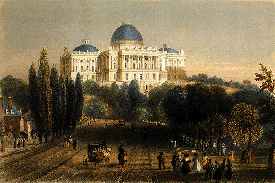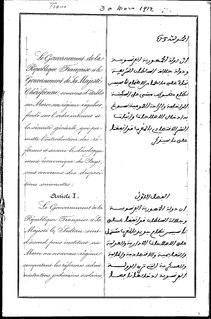
Morocco, officially the Kingdom of Morocco, is the northwesternmost country in the Maghreb region of North Africa. It overlooks the Mediterranean Sea to the north and the Atlantic Ocean to the west, and has land borders with Algeria to the east, and the disputed territory of Western Sahara to the south. Morocco also claims the Spanish exclaves of Ceuta, Melilla and Peñón de Vélez de la Gomera, and several small Spanish-controlled islands off its coast. It spans an area of 446,550 km2 (172,410 sq mi) or 710,850 km2 (274,460 sq mi), with a population of roughly 37 million. Its official and predominant religion is Islam, and the official languages are Arabic and Berber; the Moroccan dialect of Arabic and French are also widely spoken. Moroccan identity and culture is a vibrant mix of Berber, Arab, and European cultures. Its capital is Rabat, while its largest city is Casablanca.
Morocco is a member of the United Nations and belongs to the African Union, Arab League, Arab Maghreb Union (UMA), Organisation of Islamic Cooperation (OIC), the Non-Aligned Movement and the Community of Sahel-Saharan States (CEN_SAD). Morocco's relationships vary greatly between African, Arab, and Western states. Morocco has had strong ties with the West in order to gain economic and political benefits. France and Spain remain the primary trade partners, as well as the primary creditors and foreign investors in Morocco. From the total foreign investments in Morocco, the European Union invests approximately 73.5%, whereas, the Arab world invests only 19.3%. Many countries from the Persian Gulf and Maghreb regions are also getting more involved in large-scale development projects in Morocco.
A protectorate is a state that is controlled and protected by another sovereign state. It is a dependent territory that has been granted local autonomy over most internal affairs while still recognizing the suzerainty of a more powerful sovereign state without being its direct possession. In exchange, the protectorate usually accepts specified obligations depending on the terms of their arrangement. Usually protectorates are established de jure by a treaty. Under certain conditions as of Egypt under British rule (1882–1914) e.g., a state can also be labelled as a de facto protectorate or a "veiled protectorate".

The 24th United States Congress was a meeting of the legislative branch of the United States federal government, consisting of the United States Senate and the United States House of Representatives. It met in Washington, D.C. from March 4, 1835, to March 4, 1837, during the seventh and eighth years of Andrew Jackson's presidency. The apportionment of seats in the House of Representatives was based on the Fifth Census of the United States in 1830. Both chambers had a Jacksonian majority.
An associated state is the minor partner in a formal, free relationship between a political territory with a degree of statehood and a nation, for which no other specific term, such as protectorate, is adopted.

The French protectorate of Morocco, also known as French Morocco, was the French military occupation of a large part of Morocco established in the form of a colonial regime imposed by France while preserving the Moroccan royal regime known as the Sherifian Empire under French rule. The protectorate was officially established 30 March 1912, when Sultan Abd al-Hafid signed the Treaty of Fes, though the French military occupation of Morocco had begun with the invasion of Oujda and the bombardment of Casablanca in 1907.

The Spanish protectorate in Morocco was established on 27 November 1912 by a treaty between France and Spain that converted the Spanish sphere of influence in Morocco into a formal protectorate.

The Treaty of Fes, officially the Treaty Concluded Between France and Morocco on March 30, 1912, for the Organization of the French Protectorate in the Sherifien Empire, was a treaty signed by Sultan Abd al-Hafid of Morocco under duress and French diplomat Eugène Regnault on 30 March 1912. It established the French protectorate in Morocco, and remained in effect until the Franco-Moroccan Joint Declaration of March 2, 1956.

The Green March was a strategic mass demonstration in November 1975, coordinated by the Moroccan government, to force Spain to hand over the disputed, autonomous semi-metropolitan province of Spanish Sahara to Morocco. The demonstration of some 350,000 Moroccans advanced several kilometres into the Western Sahara territory. Morocco later gained control over most of the former Spanish Sahara, which it continues to hold.
An international zone is any area not fully subject to the border control policies of the state in which it is located. There are several types of international zones ranging from special economic zones and sterile zones at ports of entry exempt from customs rules to concessions over which administration is ceded to one or more foreign states. International zones may also maintain distinct visa policies from the rest of the surrounding state.

Moroccan nationality law is regulated by the Constitution of Morocco, as amended; the Moroccan Nationality Code, and its revisions; the Mudawana (Family Code; the Civil Liberties Code; and various international agreements to which the country is a signatory. These laws determine who is, or is eligible to be, a national of Morocco. The legal means to acquire nationality, formal legal membership in a nation, differ from the domestic relationship of rights and obligations between a national and the nation, known as citizenship. Nationality describes the relationship of an individual to the state under international law, whereas citizenship is the domestic relationship of an individual within the nation. Moroccan nationality is typically obtained under the jus sanguinis, i.e. by birth in Morocco or abroad to parents with Moroccan nationality. It can be granted to persons with an affiliation to the country, or to a permanent resident who has lived in the country for a given period of time through naturalization.

In July 2001, President Abdelaziz Bouteflika became the first Algerian President to visit the White House since 1985. This visit, followed by a second meeting in November 2001, and President Bouteflika's participation at the June 2004 G8 Sea Island Summit, is indicative of the growing relationship between the United States and Algeria. Since the September 11 attacks in the United States, contacts in key areas of mutual concern, including law enforcement and counter-terrorism cooperation, have intensified. Algeria publicly condemned the terrorist attacks on the United States and has been strongly supportive of the international war on terrorism. The United States and Algeria consult closely on key international and regional issues. The pace and scope of senior-level visits has accelerated.

Morocco–United States relations are bilateral relations between Morocco and the United States.

France–Morocco relations are bilateral relations between Morocco and France. They are part of the France–Africa relations.
The Treaty of Amity and Commerce between His Majesty the Magnificent King of Siam and the United States of America, or Roberts Treaty of 1833, was the first treaty between the United States and an Asian nation.

The Abraham Accords are a joint statement between State of Israel, the United Arab Emirates, and the United States of America, reached on August 13, 2020. Subsequently, the term was used to refer collectively to agreements between Israel and the United Arab Emirates and Bahrain, respectively.
The Israel–Sudan normalization agreement is an agreement that took place on October 23, 2020, whereby Israel and Sudan agreed that they will normalize relations. It is not clear if the deal establishes full diplomatic relations between the two nations. According to Axios reporting on March 10, 2021, "While Israel has presented Sudan with a draft agreement for establishing diplomatic relations, the Sudanese want an endorsement from the Biden administration." The agreement came after the agreements of Bahrain and the United Arab Emirates signed with Israel in September 2020. Unlike the latter two, Sudan had sent troops to fight against Israel in major Arab-Israeli wars and considered Israel an enemy state.
The Revolution of the King and the People was a Moroccan anti-colonial national liberation movement to end the French Protectorate and break free from the French colonial empire. The name refers to coordination between the Moroccan monarch Sultan Muhammad V and the popular Moroccan Nationalist Movement in efforts against colonialism and toward independence, particularly after the French authorities forced Sultan Muhammad V into exile on August 20, 1953—Eid al-Adha. August 20 is observed as a national holiday in Morocco in remembrance of the Revolution of the King and the People.










